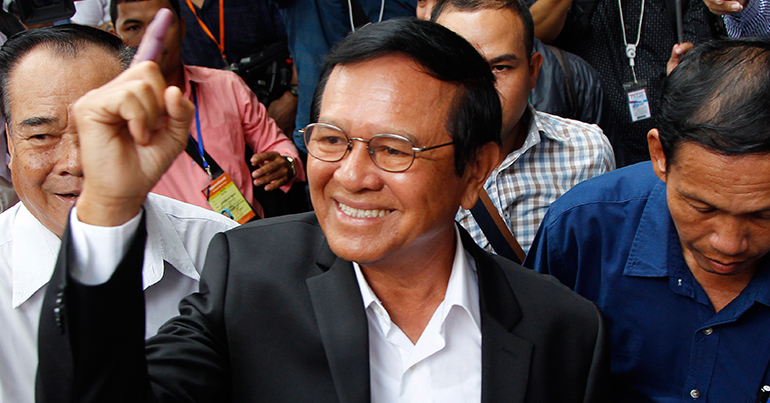The former leader of a disbanded Cambodian opposition party was released from jail and placed on house arrest Monday – three days before the European Parliament plans to discuss his case.
Kem Sokha, 65, who led the Cambodia National Rescue Party (CNRP) before it was shut down in July 2017, spent a year in a remote prison near Cambodia’s border with Vietnam on charges of treason. The CNRP’s dissolution was part of a crackdown on political parties and media outlets ahead of the general election this past July, which was swept by the ruling Cambodian People’s People (CPP), headed by long-time Prime Minister Hun Sen. Sokha and 117 other top CNRP officials were also blocked from participating in Cambodian politics for five years.
The European Union has been closely monitoring the political situation in Cambodia as it mulls over the continuation of a free-trade agreement that was initiated in 2001.
Speaking at the 39th session of the UN Human Rights Council, where Cambodia’s human rights record is on the table for discussion, the UN High Commissioner for Human Rights Michelle Bachelet welcomed the release of Kem Sokha, but warned that more must be done: “The recent elections were held amid crackdowns on dissent and independent media, and the dissolution of the former main opposition party deprived many people of their choice of representation.”
But Bachelet said Sokha’s release doesn’t go far enough.
“I welcome the releases, over the past month, of a prominent human rights defender, two journalists and several opposition members, including Kem Sokha, head of the dissolved Cambodia National Rescue Party,” Bachelet said. “But the government should also release, and drop charges against, all other political actors, journalists and ordinary citizens arrested or convicted for exercising their human rights.”
Sokha has returned to his home in the capital of Phnom Penh, according to former CNRP President Eng Chhai Eang. His daughter, Kem Monovithya, told Reuters that he is desperately in need of medical care after his year behind bars: “He has high blood sugar and he needs a long-overdue surgery on his left shoulder,” she told the newswire.
Long-time Cambodian political analyst Lao Mong Hay was dismissive of Sokha’s release, and compared the former head of the CNRP’s situation to that of Myanmar’s embattled leader, who spent 15 years under house arrest before being elected as citizen leader in 2016.
“It’s no bail for Kem Sokha; just a change of place of detention from Trapeang Phlong Prison to his own house. He is now Cambodia’s Aun San Suu Kyi,” Mong Hay told Southeast Asia Globe.
He added: “This trick shows more the spots of Kem Sokha’s jailer. It is very doubtful it can fool those who have demanded his release.”
Human Rights Watch echoed these sentiments and cautioned against optimism, and said Sokha’s release was a public relations move related to his health.
“The Cambodian government acted based on concerns about Kem Sokha’s declining health in the remote border prison where they were keeping him in isolation. They obviously recognised the public relations disaster that would occur if something happened to him in detention, and finally heeded his wife’s appeals to release him on his own recognizance for health reasons,” said Human Rights Watch Deputy Asia Director Phil Robertson.
Robertson also said that until the CNRP and its leaders are reinstated and all charges are dropped against them, the release does not signal meaningful democratic reform: “Despite the excitement connected to today’s release, we’re still a long way from a meaningful restoration of democracy and respect for human rights in Cambodia.”


